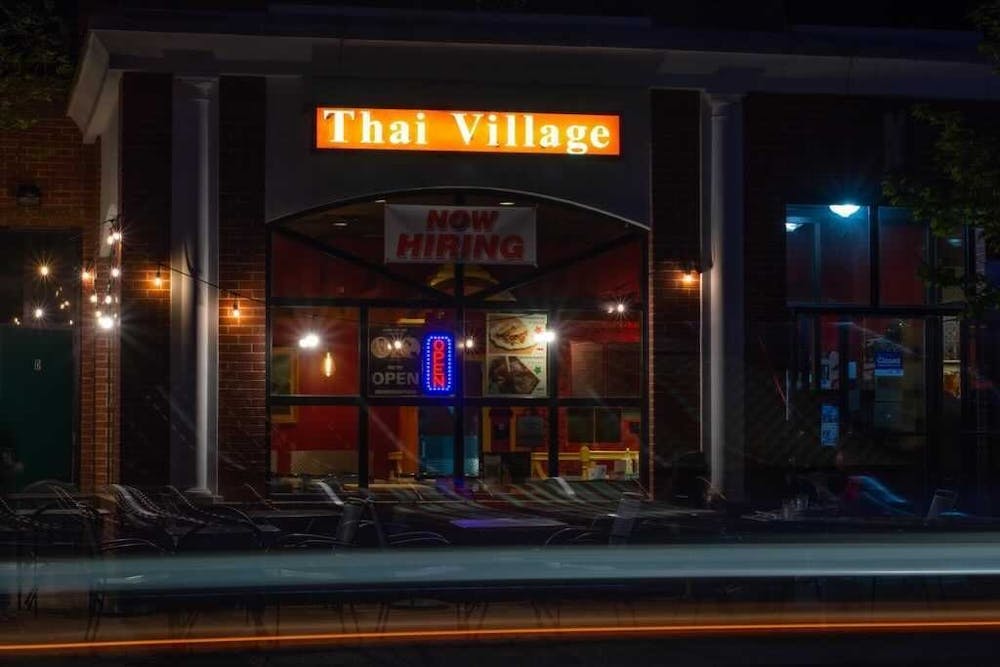Whether it’s jokingly debating the best dining hall or going to one of the restaurants lining Nassau Street, nothing beats eating and socializing with companions after a long day of classes. At Princeton, food truly brings people together. But when you have severe food allergies, this culture can sometimes mean feeling disconnected from your friends.
When I was seven years old, my family discovered I was allergic to peanuts. One Tuesday evening, my dad ate Ritz Crackers dolloped with peanut butter while reading the newspaper. I had never eaten peanut butter before, so my dad spread some of the thick and gloopy concoction on a cracker and handed it to me. A few minutes later, my lips swelled rapidly.
Several appointments and tests later, the list of my life-threatening allergies grew. Not only did I have to stay away from peanuts, but I also had to let go of tree nuts (goodbye, pistachios), sesame seeds, sunflower seeds, pumpkin seeds, poppy seeds, and coconuts.
Nine times out of ten, I couldn’t eat a birthday cake because my teachers weren’t sure if it contained nuts. I would sit in the cafeteria eating pizza instead, upset that I couldn’t celebrate my classmate’s special day beyond singing a chronically off-key “Happy Birthday to You.” While my allergies were not airborne, I was the only student in my third-grade class who sat at a separate table designated for students with allergies. I made a few friends during this time, so I did feel less alone in navigating this new journey. But oh, how I wished I could deny the existence of the dreaded warning label reading, “This product was manufactured in a facility that produces nuts.” Maybe then, food would not have separated me from my friends.
What kept me hopeful was knowing that my parents have been, and continue to be, my biggest advocates. Seemingly small actions, like my mom keeping my allergy list in her purse or my dad brushing his teeth before kissing me if he ate peanuts, make a huge difference in keeping me safe. Plus, the fact that my parents were always physically present — especially at social gatherings — made me feel like less of a burden to others. They asked the important questions for me: Did these foods contain nuts, seeds, or coconuts? If so, what could she eat instead? As a child, I was passive; any adult trying to judge my allergies was more likely to take them seriously when the information came from my parents rather than me.
I’ve learned that I need to play a more active role in advocating for my allergies now that I’m a young adult.
In October, following a pickup I attended with a campus group, we went to Thai Village. Besides cakes, I usually need to be careful with Asian foods as they often contain nuts, seeds, or coconuts. The thought of being unable to eat most of the food didn’t cross my mind; the week before, our president had sent out a Google Form asking us to list food allergies. Yet, my worst nightmare still came true.
As the waiter came upstairs to deliver the group platters, the smells of peanut-sprinkled Pad Thai and green coconut curry dominated the room. Many of our club members had never been to Thai Village. They wanted to make the most of their first (and hopefully not their last) visit, hungrily scooping more than two spoonfuls of colorful food onto their plates. I could only watch from a distance, my plate still a blank canvas waiting to be covered with food I could actually eat.

Despite this unpleasant surprise, I did not want my fellow club members to think I was rude for leaving early, so I stayed at the pickup despite desperately wanting to return to Forbes.
Two board members, remembering my allergies, went with me to order a separate dish: duck stir fry. While its description didn’t explicitly contain any of my allergens, I still asked the important questions to the waiter: Did this food contain nuts, seeds, or coconuts? If so, what could I eat instead? The waiter grew irritated; I guess he thought I was joking. Instead of taking his reaction personally, I — along with the two board members — reiterated how severe my allergies were until he took me seriously.
I’m proud of the courage I showed at that moment. Advocating for my allergies allowed me to enjoy my food more (which was absolutely delicious, by the way), and stay laughing and smiling during the pickup. It didn’t matter that I wasn’t eating the same pad thai platter or coconut curry as the rest of the group. The important thing was that I left the event feeling like a valued member of the group, which was reaffirmed by the board members sticking up for me.
Admittedly, I still worry about whether or not telling someone about my allergies at social gatherings burdens them. But if I shortchange myself to make people comfortable, only to eat a dish containing an allergen I never named, I would not be alive today. Nonetheless, I will keep advocating for my allergies even if it makes some people feel uncomfortable. Life’s too short for nuts, seeds, and coconuts to separate me from my friends.

Avery Danae Williams is a staff writer for The Prospect at the ‘Prince’ and a prospective African American Studies major, with certificates in Creative Writing (Poetry) and Gender & Sexuality Studies. She can be reached at aw4174[at]princeton.edu or on Instagram @averydanaewrites.
Self essays at The Prospect give our writers and guest contributors the opportunity to share their perspectives. This essay reflects the views and lived experiences of the author. If you would like to submit a Self essay, contact us at prospect [at] dailyprincetonian.com.








